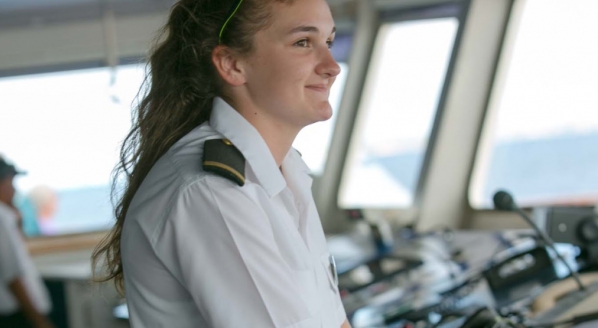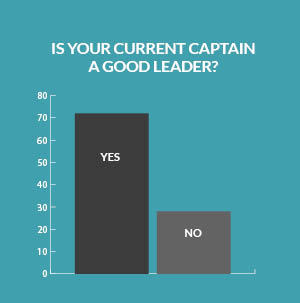Crew reveal views on learning and development
From data gathered by Faststream and Yotspot, we share insight into crew views on employment issues…
Throughout July and August 2017, superyacht recruiter Faststream and industry job board Yotspot surveyed over 1,200 superyacht crew to gain a unique insight into the views, thoughts and feelings they have about the industry they work in. While there are countless surveys regarding salaries in the yachting sector, there is rarely coverage of employment trends from a crew perspective, making this report unique.
“The aim of this report is to uncover the good and the bad of the industry, looking at yachting from an employment perspective and discovering where the industry excels and where it falls short,” explains Mark Charman, CEO of the Faststream Group. “Are crew happy? Are captains trusted and respected? Does the sector offer long-term career opportunities? These are just a few of the unanswered questions which are so unique to the industry and ones that only crew themselves will be able to answer.”
The report focuses on five key areas, including crew learning and development, health and wellbeing, career performance and pay, job seeking, and job satisfaction and engagement. Being the first report of its kind, the analysis is highly relevant and unique to the yachting sector. SuperyachtNews will bring readers a series of articles looking at each of the areas over the course of this week, beginning below with the first area: learning and development.
The results: learning and development
As with any workplace, good leadership is vital for creating a motivated team and increasing employee retention. On board happiness starts at the top, therefore it is vital for the successful running of a yacht that the captain is well respected and provides stable and trustworthy leadership for his or her crew. Having asked respondents whether they believed that their current captain is a good leader, 72 per cent said that they did.
“For the large majority of crew to say that their captain is a good leader in a completely anonymous survey speaks volumes,” says Charman. “Leadership is a big topic currently in the wider maritime sector and the advantages of having a good leader at the helm runs through the veins of a yacht. A good leader will have a good reputation and the challenges of attracting and retaining crew becomes far easier. The sector is such a close-knit community that it is not unusual for our recruiters to be asked who the captain of the yacht is by candidates.”
But what are the elements that make a captain a good leader? The survey asked the same question to both the crew and the captains themselves, with both parties offering similar answers. Communication, leading by example, fairness, empathy, patience, understanding and professionalism were all frequently listed as important traits for a great captain to have in their DNA. The one main difference is that captains listed ‘crew’ as the most prominent aspect of what makes a great captain.
When it comes to learning and development, qualifications are an important factor for crew. Basic qualifications (i.e. those required for crew to get on board and do their jobs) are still mostly being paid for by the crew themselves and not their employer. The survey found that 56 per cent of crew are paying for their own basic qualifications, 12 per cent of crew are experiencing their employers contributing to the cost, and just 32 per cent crew are having employers pay the whole cost – these are findings that differ dramatically from other maritime industries.
“Crew working within commercial maritime, regardless of rank, are not paying for their own ‘workplace qualifications’ and it is standard practice for employers to cover the entire cost of their courses,” explains Charman. “The yachting industry is very different when it comes to making crew pay for their qualifications. We have begun to see changes with an increase in employer contributions towards qualifications and other initiatives such as reimbursing costs after one years’ service. The wider issue is that yachting is disjointed in its approach to this, which leaves it far too open to interpretation.”
In light of this, does the industry need to make training more affordable for crew? The survey asked respondents what the industry should do to improve the quality and availability of training courses. Affordability came out on top, followed by higher standards, relevancy of topics and availability.
“To summarise the feedback from yacht crew, there are too many courses that are too expensive and give too little,” concludes Charman. “We had various comments from crew who believed that there was a lack of governance of crew training courses and a lack of industry information on what courses are really necessary and this should ring alarm bells for the industry. Many green crew we heard from had been caught out by paying and completing training courses that they either did not need to do, did not help them find a job, or did not help them to develop their career. Professional cadetships and apprenticeships are a hot topic in the wider maritime sector at present and yachting should take a closer look at this for inspiration.”
SuperyachtNews will continue to publish the survey's findings over the course of the week, looking closely at the other key areas of analysis.
Profile links
NEW: Sign up for SuperyachtNewsweek!
Get the latest weekly news, in-depth reports, intelligence, and strategic insights, delivered directly from The Superyacht Group's editors and market analysts.
Stay at the forefront of the superyacht industry with SuperyachtNewsweek
Click here to become part of The Superyacht Group community, and join us in our mission to make this industry accessible to all, and prosperous for the long-term. We are offering access to the superyacht industry’s most comprehensive and longstanding archive of business-critical information, as well as a comprehensive, real-time superyacht fleet database, for just £10 per month, because we are One Industry with One Mission. Sign up here.
Related news

Where should funding come from?
Unlike the merchant sector, current superyacht cadetships are not supported by the industry they seek to serve
Crew
Related news
Where should funding come from?
8 years ago
NEW: Sign up for
SuperyachtNewsweek!
Get the latest weekly news, in-depth reports, intelligence, and strategic insights, delivered directly from The Superyacht Group's editors and market analysts.
Stay at the forefront of the superyacht industry with SuperyachtNewsweek




